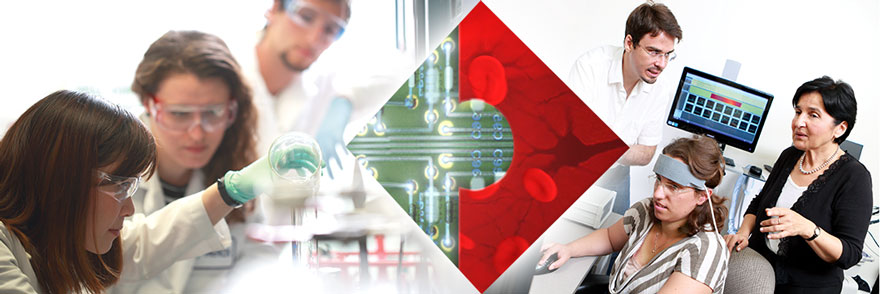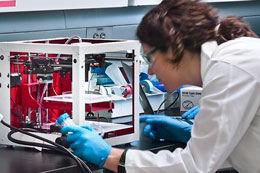What is Biomedical Engineering (BME)?
 Biomedical engineering (BME) is the application of engineering principles to solve biological and medical problems for the purpose of improving health care.
Biomedical engineering (BME) is the application of engineering principles to solve biological and medical problems for the purpose of improving health care.
You may be surprised just how many biomedical technologies you already know. Biomedical engineers created many of today's standard health care instruments. From research in the lab, to engineering at the work bench, to patient-use the hospital bedside, biomedical engineers are responsible for technologies like medical X-ray imaging, MRI & PET scans, artificial hearts, advanced prosthetic limbs, artificial hip implants, prenatal ultrasound, and arthroscopic surgery to name a few.
The marriage of technology with biology and medicine is now driving the 21st century industry. Biomedical technologies enhance the health of our citizens, create value for the economy and provide excellent experiential learning opportunities for undergraduate and graduate students.
What Does a Biomedical Engineer Do?
A biomedical engineer might be asked "how will the human body react to this new biomaterial?" Biomedical engineers might research and test biomaterials suitable for a medical implant, such as an artificial ankle replacement. "Can the material be engineered to withstand the forces of everyday use?" Alternatively, a biomedical engineer may work on large-scale manufacturing of a new drug. Biomedical engineers are responsible for production intended for human-use in clinical trials, so how the drug is produced must be safe and cost-effective so the new treatment can help as many people as possible.
Biomedical Engineers contribute in many ways to solving societies greatest problems. There are ethics-based as well as an evidence-based value judgements in the field. Biomedical engineers design, test, and implement medical solutions so they are ultimately useful to clinicians, surgeons, and patients.
Biomedical engineers work in a wide variety of settings and there are many different career paths including pathways in industry, academia, entrepreneurship, medicine and law. Additionally, the rapid advance of technology will open up new areas of work for biomedical engineers.
Student Profile: Sonali Dadoo
Hear first hand how Sonali Dadoo, a BS undergraduate student majoring in Biomedical Engineering, used her clinical immersion co-op experience at CHOP to design, build, and successfully test a biomedical device for her senior capstone project.
Watch Video
What Qualifications Do You Need To Be a Biomedical Engineer?
Biomedical engineers are expected to hold at least a bachelor’s degree in Biomedical Engineering from an Accreditation Board of Engineering and Technology, or ABET-accredited program. Biomedical engineers are expected to be knowledgeable in many areas including physics, chemistry, biology, medicine, mathematics, statistics, materials science, and engineering.
It is possible to earn an undergraduate degree in another discipline of engineering, such as electrical engineering, for example, and complete graduate studies in biomedical engineering to transition into the field. After college, biomedical engineers should expect to continue education throughout their careers to keep up with the latest improvements in technology.
For research and development and faculty positions, biomedical engineers usually need to earn a masters or doctoral degree. In addition, a graduate degree can broaden biomedical engineers educations and help them learn new technology.
Biomedical Engineering: Areas of Specialization
Biomedical engineering constantly evolves as the frontiers of biological knowledge and technology innovation advance, and the challenges of improving human health shift. Drexel BIOMED is anticipating the future of biomedical engineering by investing in strategic thrust areas with the aim to adress society's most pressing needs.
Spotlight: Neuroengineering and Neural Engineering is unlocking the inner workings of the human brain, working at the interface of engineering and neuroscience to understand, restore, and enhance the properties and capabilities of the human brain. Research areas include modeling of neural systems, neural networks, understanding evolutionary influences in biological control systems, neurocontrol, neurorobotics, and neuroprosthetics as well as brain-computer interfaces.
Moving Discoveries from Lab to Clinic
Biomedical engineers are committed to shepherding their discoveries to the clinical setting, in partnership with entrepreneurs and business, legal, and investment communities. Licensed technologies coming out of biomedical engineer's labs spur new and growing businesses and create jobs. Learn more about this topic: What is Translational Research?

Learn About Biomedical Engineering at Drexel
Undergraduate Programs Graduate Programs
Schedule a visit